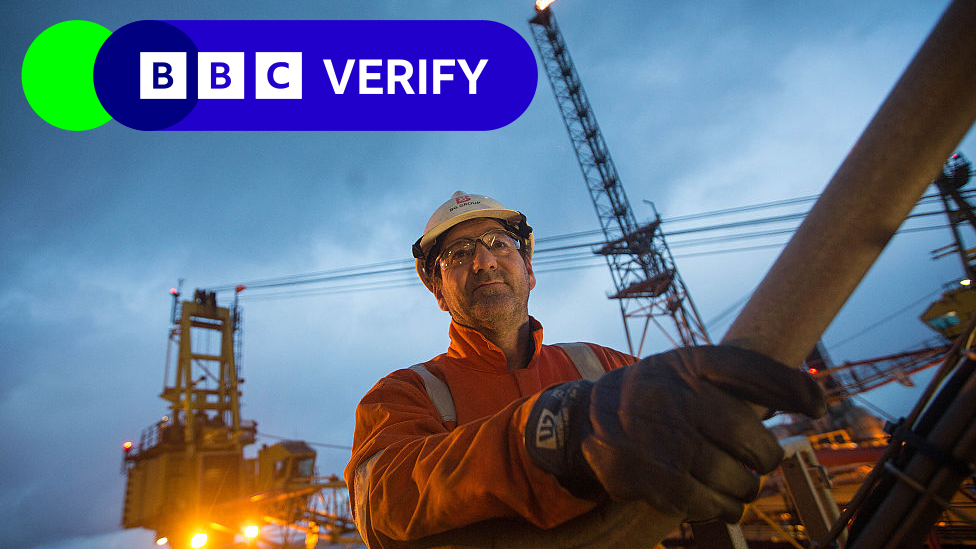North Sea oil and gas claims fact-checked
- Published

The government has been defending a plan that could see new licences granted every year for fossil fuel drilling in the North Sea.
In a debate in the House of Commons, it claimed it would be cleaner than importing oil and gas from overseas and would help the UK's energy security. Critics say it would damage the UK's reputation on climate action.
We've examined some of the claims.
Is UK oil and gas cleaner than imports?
Energy Secretary Claire Coutinho told MPs: "Gas that we bring in from abroad through LNG has four times higher emissions."
Liquified natural gas (LNG) is gas that is compressed into liquid form and shipped in, rather than pumped through pipelines.
She is right to say emissions from UK gas production are indeed roughly four times lower than imported LNG, according to figures cited by the North Sea Transition Authority, the UK's oil and gas regulator.
But most of the UK's gas imports are typically not LNG, rather they are pumped in via pipelines from Norway, according to government data.
And Norway's gas is on average much cleaner than the UK's.
These figures only relate to what's known as the "production phase" - just the greenhouse gases emitted from getting oil and gas out of the ground.
Total emissions from oil and gas come mainly from using these fossil fuels.
Will it improve UK energy security?
Claire Coutinho also told MPs: "Our bill will improve our energy security."
While the UK is heavily reliant on oil and gas imports, there's no guarantee that extra domestic production would stay in the UK, especially when it comes to oil.
This is because it is extracted by private companies, who sell it on the open international market, rather than necessarily to the UK.
For this reason - and because some oil can't be refined in the UK - around 80% of the oil produced in the North Sea is actually exported.
Most of UK North Sea gas is pumped directly into the UK network, but some is then exported to Europe, for example to be stored for winter, according to Dr Simon Cran-McGreehin, head of analysis at the ECIU, an independent energy and climate think tank.
Amanda Solloway, a minister in the Department for Energy Security and Net Zero, confirmed in December that there were no plans to force private companies to allocate oil and gas in the North Sea for domestic use.
Will it reduce UK energy prices?
Shadow climate change secretary Ed Miliband said: "the legislation we are considering today won't cut bills".
He is right. Oil and gas prices in the UK are determined by global energy prices.
"No amount of UK North Sea oil and gas will turn the dial on international prices, because our volumes are so small, and because everything is run through markets," Dr Cran-McGreehin says.
Defending the plan on BBC Breakfast on 6 November 2023, Claire Coutinho admitted: "It wouldn't necessarily bring energy bills down".
But she claimed it would raise a significant amount of money in tax revenue to help fund public services.
The government's independent climate advisers, the Climate Change Committee (CCC), argue that the best way to reduce the reliance on imports and lower bills is to boost renewables and other low carbon technologies to reduce the demand for fossil fuels in the first place.
Over the past decade, the government has made progress in boosting UK's renewable electricity generation - from 7% of the total in 2010 to over 40% last year.
Will the UK still need oil and gas at net zero?
Claire Coutinho also said: "Even the Climate Change Committee's own data shows that when we reach net zero in 2050, we'll still be using oil and gas."
It is true that the UK will still use some oil (mainly for aviation) and gas (mainly for electricity and fuel supply) in 2050, as the chart below from the CCC confirms.
This is the date by which the UK has pledged to reach net zero - the point where the UK no longer adds to the total amount of greenhouse gases in the atmosphere, by removing as much as it emits.
But UK demand for oil and gas needs to fall 80% by 2050 for the UK to meet its targets, the CCC says.
In particular, it says there will be much less need for oil - which makes up most of the remaining North Sea reserves - as cars, trains and buses switch away from petrol and diesel.
For this reason, the CCC has distanced itself from the idea that it backs new UK oil and gas.
Prof Piers Forster, the interim chair of the CCC, tweeted in response to the proposed legislation that further oil and gas licensing was "inconsistent with climate goals".
This is because countries agreed to transition away from fossil fuels at the last year's COP28 climate summit. Some fossil fuels need to be kept in the ground to have a chance of limiting warming to globally agreed levels, says Rebecca Willis, a professor of energy and climate governance at Lancaster University.
The International Energy Agency has previously said there is no need for investment in new oil and gas projects to meet global energy demand.